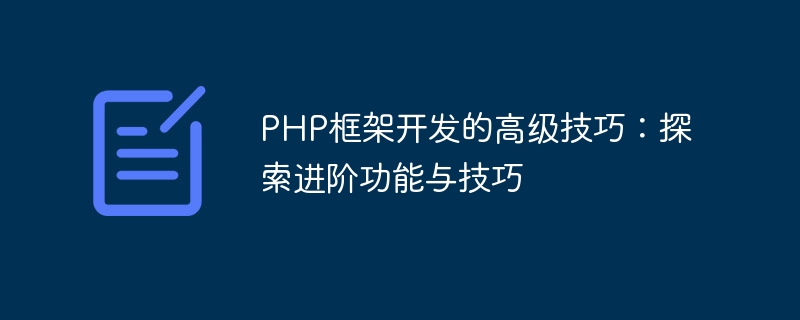

As web applications become more and more complex, developers need to use more efficient tools and technologies to improve development efficiency, maintainability and scalability. The PHP framework has become an essential tool for developers to invest in web development. This article will explore advanced techniques for PHP framework development, including advanced features and techniques.
Inversion of Control is a design pattern whose goal is to improve maintainability by decoupling the relationships between components and scalability. In the PHP framework, inversion of control is generally implemented through dependency injection (DI).
When an object needs another object, it no longer creates the object, but gives the right to create it to another object. This process is called dependency injection. Through dependency injection, we can better manage the relationships between objects and improve maintainability and scalability.
Extension package is a module in the PHP framework used to extend the functionality of the framework. In the PHP framework, extension package development is a very important skill. Through extension package development, we can encapsulate some common functions in a package and then reuse them in different projects.
The development of expansion packs also requires some skills. First, we should ensure the quality of the expansion pack. This means we need to write high-quality code, provide complete documentation, test the code for correctness and reliability, etc. Secondly, we need to consider how to implement automatic loading of packages, dependency management, namespace and other issues.
Middleware is a commonly used function implemented in the PHP framework. Middleware allows us to pass requests to multiple processors and filter, transform or modify requests.
Middleware can also act as interceptors for specific functions, such as authentication, authorization, caching, etc. Among them, authentication and authorization are common functions implemented using middleware.
Event-driven architecture is a common design pattern that communicates events to multiple listeners in response to different behaviors through a publish-subscribe model. . In the PHP framework, event-driven architecture can be used to handle various events, such as routing, requests, responses, databases, etc. Event-driven architecture makes it easy to coordinate interactions between multiple components.
In the PHP framework, event-driven architecture basically consists of the following components:
Caching technology can greatly improve the performance and response speed of web applications. In the PHP framework, caching technology is widely used in fields such as data access, view rendering, and page caching.
The implementation of cache technology involves the development of cache drivers, the design of cache strategies and the implementation of cache cleaning. Developers can also use third-party caching libraries such as Redis, Memcached, etc.
Summary
This article introduces advanced techniques for PHP framework development, including inversion of control, extension package development, middleware, event-driven architecture and caching technology. These tips can help developers better manage complex web applications and improve development efficiency and maintainability.
The above is the detailed content of Advanced techniques for PHP framework development: Explore advanced features and techniques. For more information, please follow other related articles on the PHP Chinese website!




